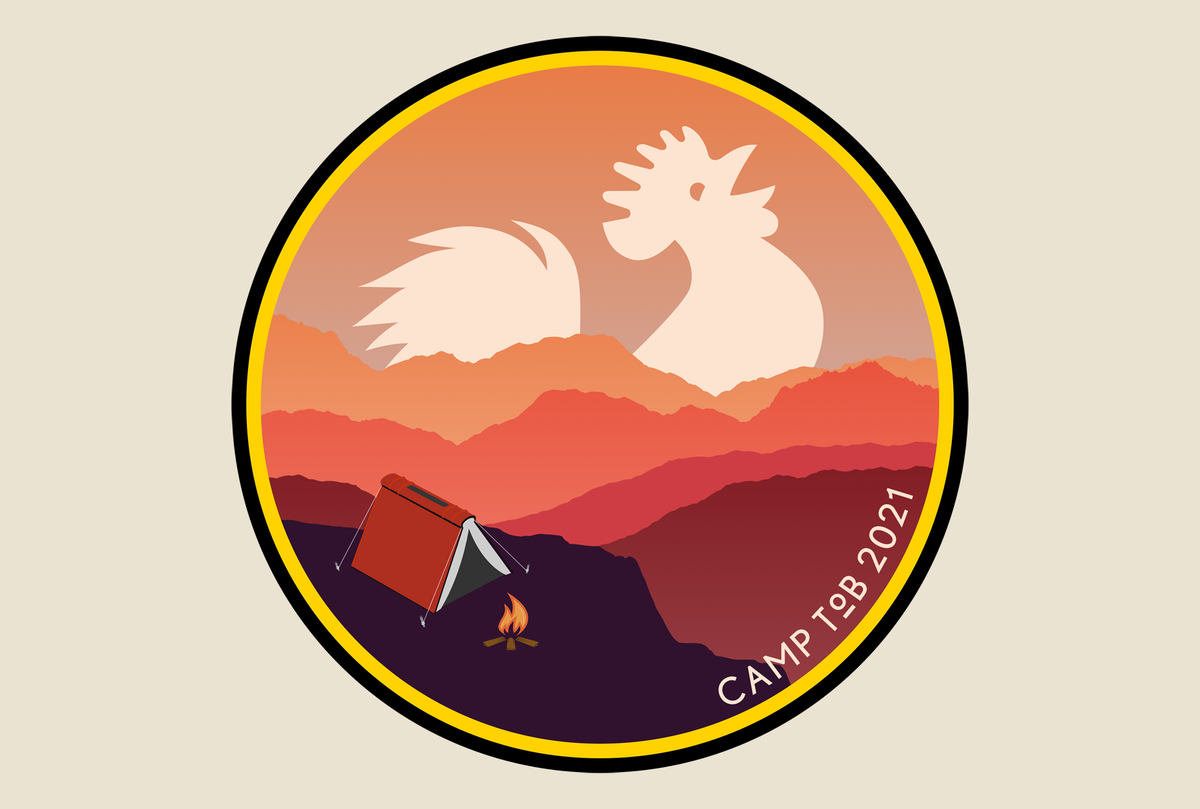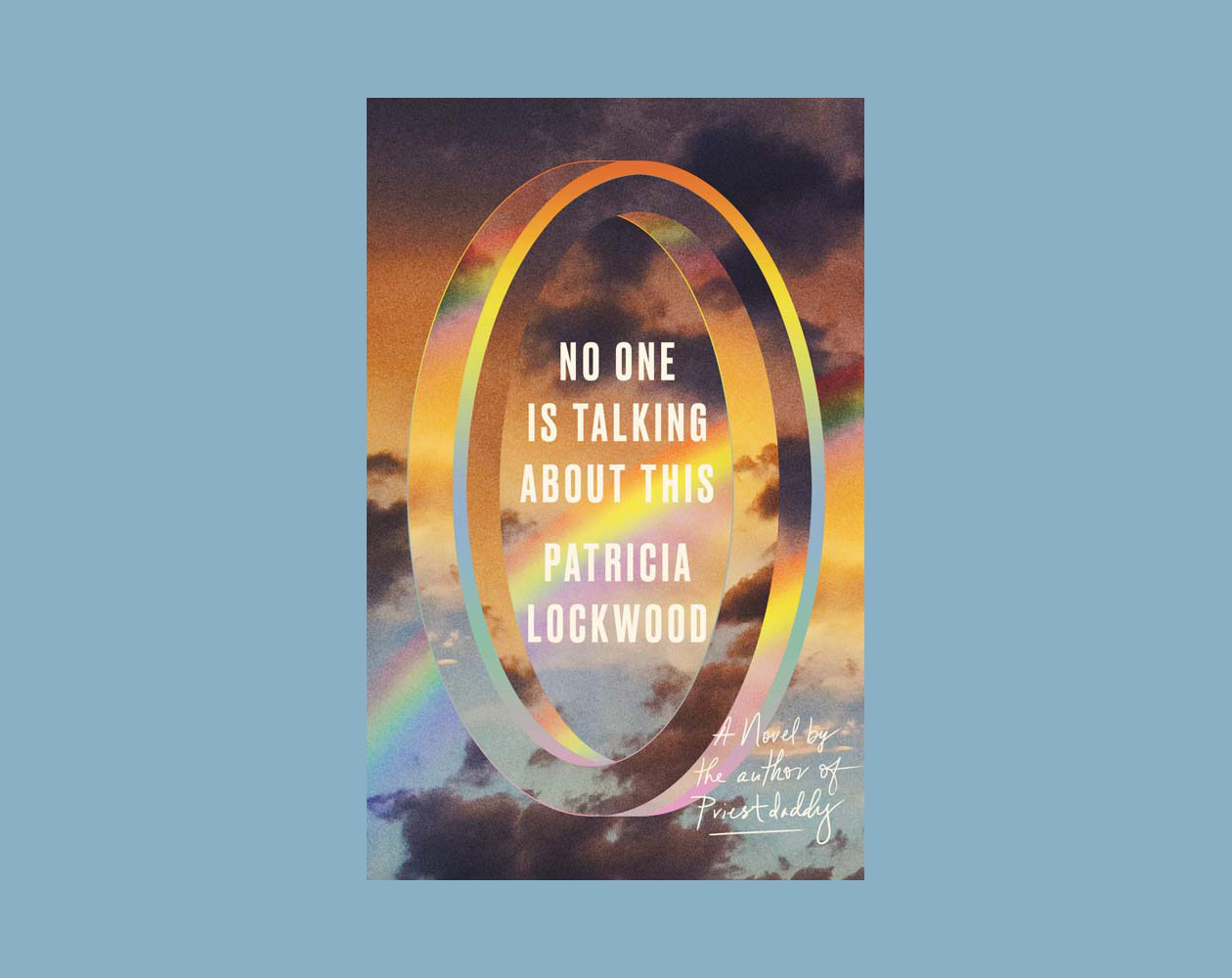Week One: No One Is Talking About This
Camp ToB 2021 is officially in session! This week, we're discussing the first half of Patricia Lockwood's No One Is Talking About This.

Rosecrans Baldwin: Welcome, campers, to Summer 2021's edition of Camp ToB! Here's how it works: Each week from now through the end of August, we're going to discuss a novel (selected by you, the readers), at a pace of two books a month. At the end of each month, you will vote for one title as your favorite, and at the end of the summer, the community will pick one of the three favorites to advance to a berth in the 2022 Tournament of Books (ToB).
FYI, the five books we read this summer that don't win the pennant may still qualify for the 2022 ToB's long or short lists.
I'm going to be facilitating the conversations this month, with Meave hosting in July, and Andrew in August. This week, we're talking about the first half of Patricia Lockwood's No One Is Talking About This, and our Activity Leader is Nebraska's Lauren Schmoke. Lauren, please introduce yourself to everyone.
Lauren Schmoke: Hi, I'm Lauren! I'm originally from Michigan but I live in Omaha. I've been the kind of person who always wants to be reading since I learned how to read, so phone reader apps were revolutionary to me. I buy regular books for my family, friends, and coworkers (and would like to thank my local bookstore, The Bookworm, for having multiple copies of No One Is Talking About This in stock), but I do the most reading on my phone. I used to be embarrassed about this, but I'm all about accessibility.
Rosecrans: I see zero cause for embarrassment here.
Lauren: Reading books on my phone seems to save me from falling too deeply into social media wormholes. Time passes differently when you're reading compared to doomscrolling?
Rosecrans: Maybe doomscrolling is not reading so much as death by a thousand cuts? Are you mostly a fiction reader?
Lauren: I read a lot of fiction, but I don't exclusively read fiction. I don't read many books by white cis male heterosexual authors—I read way too many when I was younger, spent a couple of years trying to consciously balance it out, then never really went back to them.
Rosecrans: And you've been doing the ToB for a while, is that right?
Lauren: I followed the ToB in its first year (2005)! And the first year I started specifically reading for it was 2006. I'm a huge fan and always excited to see the long list and to try to tackle as much of it as possible.
Rosecrans: Well, that's all terrific.
So, here's what everybody is talking about today, or at least we'll be talking about: the first half of a novel that is loosely about a woman, her Twitter account, the internet generally—which the narrator refers to as "the portal"—and what it's like to navigate life when a lot of your life (most of your life?) is experienced in said portal, after having become somewhat famous for a post that asked the question "can a dog be twins?"
Lauren, to start us out, what do you think: Can a dog be twins?
Lauren: Yes! Of course! Dogs can be anything they want to be. I call my dogs the wonder twins.

Rosecrans: How about this: How online are you? Because the first half of this book, I imagine, will mean one thing to somebody who knows their way through Twitter and Tumblr and fatbergs, and memes like STOP! DON'T EMAIL MY WIFE!, and another thing to someone who does not.
Lauren: I think I probably belong in the "very online" category. For anyone that's not "very online," or not hopelessly addicted to Twitter, I'd direct your attention to this piece explaining a lot of the memes referenced in the book.
I think this is a book about Twitter specifically, but I would love to read a book about Tumblr. I'm not sure if this is true of Twitter but it always seemed like Tumblr was dominated by voices that were not white cis heterosexual males. I think No One Is Talking About This is a book for people that are very online, not just in the sense that there are so many references to tweets that read like inside jokes, but in the sense that so much of the first half of this book is about what being very online feels like.
Rosecrans: I mean, I don't know who Lockwood intended this book for—if anyone—but it sounds like you're an ideal reader.
Lauren: I don't think this book is for everyone, but I would read thousands of pages of this. Lockwood has an incredible voice. I love the way that she wrote a book about Twitter because it's a massive part of our culture and I don't know if we truly consider its impact as much as we should. I think the only thing I struggled with was feeling too seen!
Rosecrans: For my part, as someone who's both very online in some ways and barely online in others, there's an airiness and flipness to the tone that I really enjoyed, but also a sense of being bored and untouchable that started to feel exhausting. I guess I enjoyed the narrator's way of going about the world, but I didn't enjoy the narrator? To a point that tone, in and of itself, expressed in these snippets of observation and reaction, began to feel like the book's larger purpose (not dissimilar from Weather, as discussed in last summer's Camp ToB), and I was close to putting the book down. What do you think?
Lauren: I'm not sure if I read a sense of boredom as much as desensitization? Maybe the word I'm really looking for is anesthetization. I definitely think that tone is intentional and an integral part of the overall theme. We're all using Twitter to protect us from boredom, but when you're constantly scrolling I think it tends to start to seem like repetitive patterns.
The accuracy of this:
The people who lived in the portal were often compared to those legendary experiment rats who kept hitting a button over and over to get a pellet. But at least the rats were getting a pellet, or the hope of a pellet, or the memory of a pellet. When we hit the button, all we were getting was to be more of a rat.
And the passage that starts: "Why had she elected to live so completely in the portal? It had something to do, she knew, with Child Chained Up in the Yard." It keeps me awake at night! I don't know if I can think of anything else that simultaneously helps us and harms us quite like social media.
No One Is Talking About This by Patricia Lockwood

A woman who has recently been elevated to prominence for her social media posts travels around the world to meet her adoring fans. She is overwhelmed by navigating the new language and etiquette of what she terms "the portal," where she grapples with an unshakable conviction that a vast chorus of voices is now dictating her thoughts. "Are we in hell?" the people of the portal ask themselves. "Are we all just going to keep doing this until we die?" Suddenly, two texts from her mother pierce the fray: "Something has gone wrong," and "How soon can you get here?" As real life and its stakes collide with the increasingly absurd antics of the portal, the woman confronts a world that seems to contain both an abundance of proof that there is goodness, empathy, and justice in the universe, and a deluge of evidence to the contrary.
Book description excerpted from publisher's summary and edited for length.
Rosecrans: I hear that, but I want to push back a little. People aren't powerless; the apps don't control us yet. How much of that harm is self-inflicted, even gladly self-afflicted? Lockwood's narrator seems to derive so much ego from her online persona, it seems like it might be crippling to detach.
Lauren: I assume that the majority of the harm suffered is self-inflicted, but I think the core of the addiction for many people relates to comfort and control. There are definitely elements of Twitter that are soothing. The endless scroll assuages boredom. It also fosters a sense of detachment, both from reality and from the self, while simultaneously peppering in continuous reminders of our bodies and our traumas. There are other elements of Twitter that seem to want to demonstrate that there's a sense of morality tied to following the news, and that this gives people a feeling mimicking some minimal degree of control.
Rosecrans: That's a great point.
Lauren: This is a double-edged sword because the line between bearing witness and desensitization is thin and blurry. I think the more egotistic elements of Twitter are also about comfort and control, about the comfort of attention and affirmation combined with exerting complete control over your "image" and what people are able to view.
Rosecrans: Did you underline any other passages?
Lauren: I underlined this:
They kept raising their hands excitedly to high-five, for they had discovered something even better than being soulmates: that they were exactly, and happily, and hopelessly, the same amount of online.
Rosecrans: How come?
Lauren: I convinced my partner to download Twitter and now we're the same amount of online. Sharing tweets is our love language, even though half of it is jokes and cute animals, and the other half is horrors from the news. We both had a lot of feelings about: "For as long as she read the news, line by line and minute by minute, she had some say in what happened, didn't she? She had to have some say in what happened, even if it was only WHAT? Even if it was only HEY!"
"Your attention is holy," she told the class, as her phone buzzed uncontrollably in her back pocket, for a long-ago joke she had made about a Florida politician "who nearly died during elective taint-lengthening surgery" was receiving renewed attention that morning.
What a sentence! Why do we choose this?
Rosecrans: Lol.
Since we're only discussing the book's first half today, let me try a tangent for a moment. We've seen a number of "internet books," for lack of a better term, be published in the last couple of years. Does the genre interest you? I wonder because I've been reading Lockwood ever since "Rape Joke," which means I had already sort of read the book's first half a while ago—it's derived from a PowerPoint presentation that Lockwood gave in 2019 (that was also published online with embedded images, GIFs, and tweets). So, are internet books... better on the internet?
Lauren: I am fascinated by the "internet books," and I've been thinking a lot about what qualifies as an internet book and some of the other ones I've read. I think my first introduction to the internet book was Megan Boyle's Selected Unpublished Blog Posts of a Mexican Panda Express Employee, which I think was published as poetry. I'm currently reading Liveblog and I find it overwhelming, but I think Boyle is a genius. I love that Liveblog is a book. I think more things from the internet should be books.
Rosecrans: I guess I picked the right person to ask about internet books! Do you have any other favorites?
Lauren: One of my absolute favorites is I'm Trying to Reach You by Barbara Browning. Not only does the narrator discover that dancers are being murdered through reading YouTube comments, but Browning created the dance videos too and you can watch them on YouTube. I wish I could think of more examples that were this cool but I really can't. Barbara Browning is hard to beat. The only thing I can think of that comes close in terms of multimedia books is Love Dog by Masha Tupitsyn.
Rosecrans: But let's stay on genre for a moment—we can focus on the Browning book. What about it works well?
Lauren: There are two elements of the internet that Browning writes about so well, and I cannot think of anyone doing this better than her or earlier than her. The first is the feeling of an internet wormhole, of being too interested or unable to look away. Lockwood's book addresses viral Twitter fame, and occasionally needing to be rescued by her husband when she gets sucked in too deep, but I'm Trying to Reach You addresses what can happen when the internet becomes consuming. I think Browning also writes about what we all secretly hope to discover when we venture to one of the darkest parts of the internet—the comments section—and that there's sometimes new information to discover for the most devoted seekers willing to sink to the bottom.
Rosecrans: Commentariat, we look forward to hearing your thoughts about this.
Lauren: The only other book I've read recently that was really specifically "about" Twitter was Literally Show Me a Healthy Person by Darcie Wilder, who I also think is a genius. I've also thought a lot about Zeros and Ones by Sadie Plant, where she discusses how women have always been the pioneers of technology and the first computers were women.
I definitely think of Lockwood as being internet-famous first; I remember "Rape Joke" going viral long before Priestdaddy was published and she became famous-famous. My introduction to her was Motherland Fatherland Homelandsexuals and my absolute favorite poem of hers is "He Marries the Stuffed-Owl Exhibit at the Indiana Welcome Center."
Rosecrans: So, without looking too far ahead, how is the book sitting with you at the halfway point? Where does it fall short, or is this a Best Book Ever?
Lauren: I was hooked from the start and I think Patricia Lockwood is a uniquely talented writer. If the first half of the book falls short anywhere, I'd say that it lacks momentum; it's missing that quality that makes a book difficult to put down. However, my best guess is that this is an intentional choice, a statement about how it feels to read more Twitter than novels and what it's doing to our brains. I also think the second half of this book is a lot different than the first, so don't give up!
Rosecrans: Well, like I said, I almost dropped the book before the first half was finished, and I'd echo the advice—don't give up is right!
Thanks so much, Lauren! Everyone else, we'll see you in the comments and then back here again next week for the book's second half. To stay up to date on Camp ToB and all things Rooster, make sure you sign up for the Rooster newsletter. You can also follow us on Twitter, Facebook, and Instagram.
Finally, we want to extend major thanks to our Sustaining Members for making this event possible. Please take a moment to find out why TMN and the ToB depend on your support, and consider becoming a Sustaining Member or making a one-time donation. Remember: Sustaining Members get 50 percent off all ToB merch at the TMN Store, including Camp 2021 designs!
The Camp ToB 2021 Calendar
- June 2: No One Is Talking About This through part one
- June 9: No One Is Talking About This to the end
- June 16: Detransition, Baby through chapter four
- June 23: Detransition, Baby to the end
- June 30: Klara and the Sun through part three
- July 7: VACATION
- July 14: Klara and the Sun to the end
- July 21: Whereabouts through "At the Cash Register"
- July 28: Whereabouts to the end
- Aug. 4: Peaces through chapter eight
- Aug. 11: Peaces to the end
- Aug. 18: Everyone Knows Your Mother Is a Witch through page 137
- Aug. 25: Everyone Knows Your Mother Is a Witch to the end
- Sept. 1: Announce summer champion
You can find all our summer titles at our Camp ToB 2021 Bookshop list.
